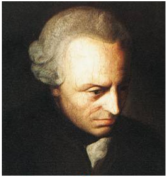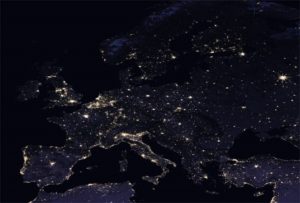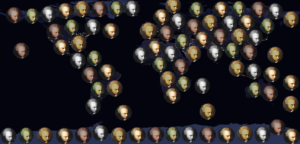We – the practitioners, researchers, and students of regional studies – care about making the world a better place to live for all. In our efforts, we aim for a balanced and sustainable development, reducing disparities, social inclusion, and providing equal opportunities for everyone. We conduct research, develop strategies, plans, and policies, because we want to contribute to their realization. We also have a keen interest in understanding human geographies. Many of us chose this specific field of study as our ‘human activity’, as a result of these ‘social inclinations’ of ours. However, we may also find ourselves in a dilemma and may ask:
What is the meaning behind the ‘means’ (e.g. innovation and transport investments, cooperation strategies, institutional arrangements) that we choose to employ in order to achieve our goals? In other words, what do our ‘actions’ serve for? Is there a higher purpose?
It is this exact moment of inquiry, which enables us to build a strong relationship between ‘regional studies’ and ‘political philosophy (or political theory)’. Sheldon S. Wolin (2004) says that, “Political theory is not so much interested in political practices, or how they operate, but rather in their meaning.” Therefore, political philosophy can provide an answer to our question. In my research named “Irrational Geographies vs. Kant’s Cosmopolitan Duty: Contribution of EU Cohesion Policy”, I attempted to find an answer to our question from the perspective of Immanuel Kant and applied it to the case of the European Union’s (EU) Cohesion Policy. The result, in short, is:
We support Nature in realizing her plan for humanity, by contributing humanity’s progress towards establishing Kant’s Cosmopolitan Union.
Kant’s Cosmopolitan Union
In his essays, which are collected under “Kant’s Principles of Politics, including his Essay on Perpetual Peace. A Contribution to Political Science”, Kant (2011) presents Cosmopolitan Union (in my words) as the highest end to be achieved by humanity:
The whole universal human history can be regarded as the realization of a hidden universal plan (highest purpose) of Nature. It will be realized at last, when all the ‘capacities’ implanted by her (Nature) in human species will be completely developed by forming a class of ‘rational’ beings. Its possibility lies in the establishment of a Cosmopolitan Union (Universal Cosmopolitan Institution, Perfect Civil Union, Great Future Political Body, Universal International State, Union of Nations, Pacific Federation – Foedus Pacis) (Kant, 2011).
 Immanuel Kant – Image from: Waterstones (2017).
Immanuel Kant – Image from: Waterstones (2017).
Forming a class of ‘rational’ beings is crucial for the realization of a Cosmopolitan Union. According to Kant (2011), wars, conflicts, and hostilities in the world result from human beings’ ‘unsocial inclinations’, such as the desire to gain individual wealth, rank, and power among others, as well as their tendency to isolate themselves from the others. When the ‘reason’, finally, overcomes the power of unsocial inclinations, it will ‘guide’ all nations of the world to establish lasting peace. Kant (2011) says, “Reason on the throne of the highest law-giving power, makes the state of Peace an immediate duty.” Kant also says that, the humanity will do progress and establish a Cosmopolitan Union, because it is a duty to become better, according to the ‘Principle of Progress’.
David Harvey (2000) says that, “…to open the dialectic between cosmopolitanism and geography is immediately to see that there can be no universality without particularity and vice versa, that both are always implicated in (an ‘internal relation of’) the other.” Martha Nussbaum (1996 and 1997) and Harvey both say that ‘regions’ are associated with ‘particularities’, due to being equipped with reason and inclinations like human beings. These arguments support my attempt to study a Cosmopolitan Union at a ‘regional’ scale, which is originally based on the relationship between nation-states.
 “When the sun goes down, the lights of human activity shine bright.” Full-hemisphere views of Earth (NASA, 2017a).
“When the sun goes down, the lights of human activity shine bright.” Full-hemisphere views of Earth (NASA, 2017a).
Kant (2011) says that, “A philosophical attempt to work out the Universal History of the world according to the plan of Nature in its aiming at a perfect Civil Union must be regarded as possible, even capable of helping forward the purpose of Nature.” Based on that, I rephrased our question and asked;
Do, and if yes how do the actions of the EU Cohesion Policy contribute to humanity’s progress towards establishing Kant’s Cosmopolitan Union?
Developing a Philosophical Framework for Regional Studies
I developed two philosophical frameworks and applied them to my research:
Philosophical Framework 1: “Two Stages of Establishing Cosmopolitan Union” (developed based on Kant, 2011): I grouped activities of the EU Cohesion Policy under progress in Stage I (arts, science, and civilization) and Stage II (morality). This framework coincides with Aristotle’s (1980) differentiation between ‘production’ and ‘action’.
Philosophical Framework 2: “Non-linear Hierarchy of Ends” (developed based on Aristotle, 1980, and Kant, 2002 and 2011): This framework enabled me to consider the contribution from all actions of the EU Cohesion Policy as eligible, without being limited to their ‘moral worth’ (if guided by reason or inclinations). It also enabled me to make a differentiation between ‘planned activities’ and ‘unplanned activities’ (as immediate response to challenges)”.
Results
I interpreted each correlation between ‘indicators of a Cosmopolitan Union’ (from Kant, 2011) and ‘activities of EU Cohesion Policy’ as an eligible contribution to humanity’s progress.
 “When the sun goes down, the lights of human activity shine bright.” Composite image of Europe at night, 2016 (NASA, 2017b).
“When the sun goes down, the lights of human activity shine bright.” Composite image of Europe at night, 2016 (NASA, 2017b).
Contribution to Stage I
I. “Human nature is only half way in its progress… We are cultivated in a high degree by science and art… We are civilized, even to excess.” (Kant, 2011):
- Supports research, technological development, innovation, competitiveness, transport infrastructure, education, culture, urban development, employment, information and communication technologies (European Commission, 2017).
Contribution to Stage II – I: Planned
“Before the last step of bringing in a Universal Union of States is taken, last stage which our race has yet to surmount be left out of view. There is still much to be done before we can be regarded as moralized. The idea of morality certainly belongs to a real culture. A long internal process of improvement is thus required in every commonwealth as a condition for the higher culture of its citizens.” (Kant, 2011).
II.I.I “After a number of generations a considerable inequality may arise among the members of a commonwealth. These circumstances ought not to hinder any of the subjects of state from rising to such positions as their talent, their industry, and their fortune may make it possible for them to fill… No objection can be taken to seeking assistance. A loan, as a source of aid in such cases, is above suspicion.” (Kant, 2011):
- EU member states with the highest GNI levels are the major contributors of funds that are targeting disadvantaged regions, which are usually located outside their state-borders.
II.I.II “Uninhabitable portions of this surface are formed by seas and deserts, these present barriers to the fellowship of men in society; but they are of such a nature that the ship or the camel, ‘the ship of the desert’, makes it possible for men to approach each other over these regions… The right which the human species has in common to the surface of the earth.” (Kant, 2011):
- Supports the accessibility and transport systems of peripheral regions.
II.I.III “A universal agreement cannot be expected from a whole people, but only of their delegates as representative of the people… Peoples or nations regarded as States may be judged like individual men.” (Kant, 2011):
- Members of the European Committee of the Regions are regional and locally elected representatives. “Regions” are judged like individuals.
II.I.IV “Men with their plans start only from the , and even continue to regard the parts alone, while the whole as such is viewed as too great for them to influence and as attainable by them only in idea. Being adverse to each other in their plans, they would hardly be able to unite together in order to influence the whole out of any particular free purpose of their own.” (Kant, 2011):
- Partnerships, cooperations, and operational programmes align plans at sub-national and national levels with the EU Cohesion Policy and the Europe 2020 Growth Strategy.
II.I.V “The older generations appear only to pursue their weary for the sake of those who come after them, preparing for the latter another stage on which they may carry higher the structure which Nature has in view.” (Kant, 2011):
- Starting with the first Treaty of the EU, the creation of the DG Regional Policy in 1968, the ERDF in 1975, ending up at the current programming period of the EU Cohesion Policy, and looking ahead towards post-2020.
II.I.VI “We will form ourselves into a State, which will peacefully settle our differences.” (Kant, 2011):
- Support to activate unique regional potentials and attractivenesses (e.g. tourism), EU-wide dialogue and mobility, social inclusion.
Contribution to Stage II – II: Unplanned
Unexpected challenges that intervene progress, require immediate responses, and these responses determine future directions. I interpreted EU’s experiencing, exercising, and learning ‘cosmopolitan duties’ dealing with challenges as contribution.
II.II.I “Right to the common possession of the surface of the earth, to no part of which anyone had originally more right than another… From its being a globe, they cannot scatter themselves to infinite distances, but must at least bear to live side by side with each other… Rights of men as citizens, shall be restricted to conditions of universal hospitality… Strangers arriving in another state, entering into social intercourse with the inhabitants of the country, not to be treated by its citizens (in a hostile way) as an enemy… In this way, distant continents may enter into peaceful relations with each other.” (Kant, 2011):
- Migrants, Asylum Seekers, and Refugees: Support to their integration, employment, health, education, housing; awareness raising and institutional cooperation in host-regions.
II.II.II EU Enlargement, Widening Regional Disparities: Parallel increase in the EU Cohesion Policy’s budget.
Interruptions: “Progress although it may be sometimes interrupted, will never be entirely broken off or stopped. Now whatever doubts may be drawn from history against my hopes, I am not entitled to give up the guidance of duty which is clear.” (Kant, 2011):
- Regarding II.II.I: Migrant-attracting member states’ concern about strain on local services and acceptance level of locals (Venables, 2015).
- Regarding II.II.I and II.II.II: Associated with Brexit (Hunt and Wheeler, 2017).
II.II.III Natural Disasters: Immediate supports from the EU Solidarity Fund.
II.II.IV Economic and Financial Crisis: Immediate responses to job-losses, bankruptcies, and public debt in disadvantaged regions (e.g. flexibilities, increased pre-payments, reduced national co-financing).
Conclusion
With the motive of discovering the meaning behind the ‘means’ that we – the practitioners, researchers, and students of regional studies – employ to realize our aim to make positive change in the world, to make it a better place to live for all; I showed in this research, in the case of the EU Cohesion Policy, that we support Nature on realizing her plan for humanity, by contributing in various ways humanity’s progress towards establishing Kant’s Cosmopolitan Union.
 Designed on NASA’s (2017c) map.
Designed on NASA’s (2017c) map.
I do hope that, this research contributes to;
- the debate about the EU Cohesion Policy’s future with improvements for post-2020,
- strengthening the ‘link’ between the theory and practice/ theoretically-informing practice, in regional studies,
- our ‘vision’ on what we can achieve through regional studies,
- literature, the process of developing a strong and comprehensive ‘philosophical theory for regional studies’, one that is applicable to practice,
- and, finally, humanity’s progress towards establishing a Cosmopolitan Union.
Irmak Beril Çağlı
Ph.D. Student in Political Science and International Relations, Boğaziçi University, Turkey
References:
Aristotle (1980). “The Nicomachean Ethics/ Aristotle”. Translated with an Introduction by David Ross; Rev. by J. O. Urmson, Oxford University Press.
European Commission (2017): https://ec.europa.eu/regional_policy/en/policy/what/glossary/t/thematic-objectives
Harvey, David (2000). “Cosmopolitanism and the Banality of Geographical Evils”. Millennial Capitalism and the Culture of Neoliberalism, Public Culture, Spring 2000, 12(2): 529-564, doi:10.1215/08992363-12-2-529: https://www.davidharvey.org/media/cosmopol.pdf
Hunt, Alex and Wheeler, Brian (2017). “Brexit: All You Need to Know about the UK Leaving the EU”. BBC. 5 September 2017: https://www.bbc.com/news/uk-politics-32810887
Kant, Immanuel (2002). “Groundwork of the Metaphysic of Morals in Focus”. Eds. by Lawrence Pasternack. Routledge, London NY.
Kant, Immanuel (2011). “Kant’s Principles of Politics including his Essay on Perpetual Peace, a Contribution to Political Science”. Edited and translated by W. Hastie, 2011. Digireads.com Publishing. Ebook ISBN 13: 978-1-4209-3992-7.
NASA (2017a): https://www.nasa.gov/sites/default/files/thumbnails/image/blackmarble2016-continents.jpg
NASA (2017b): https://www.nasa.gov/sites/default/files/thumbnails/image/2016-europe.jpg
NASA (2017c): https://www.nasa.gov/sites/default/files/thumbnails/image/blackmarble2016-1500px_0.jpg
Nussbaum, Martha (1996). “For Love of Country: Debating the Limits of Patriotism”. Boston, Beacon Press.
Nussbaum, Martha (1997). “Kant and Stoic Cosmpolitanism”. Journal of Political Philosophy, 5, 1-25.
Venables, Tony (2015). “Background Discussion Document Free Movement of People within the European Union under Threat”. Basic European Rights to Free Movement under Threat, Conference, Brussels. From (on 11.09.2017): https://www.eesc.europa.eu/resources/docs/soc_2015-01-27_conference_discussion_document_en.pdf
Waterstones (2017): https://www.waterstones.com/book/critique-of-pure-reason/immanuel-kant/marcus-weigelt/9780140447477
Wolin, Sheldon S. (2004). “Politics and Vision: Continuity and Innovation in Western Political Thought”. 1960, 2004 Expanded Ed. Princeton University Press. ISBN 0-691-11977-5.